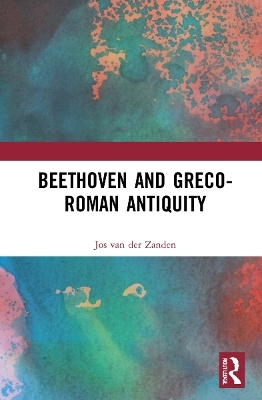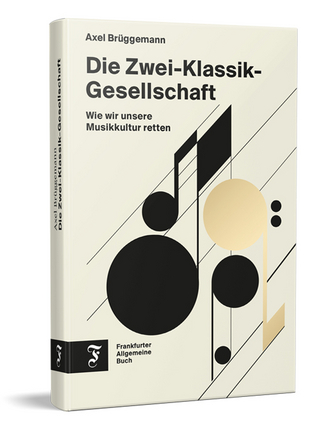
Beethoven and Greco-Roman Antiquity
Routledge (Verlag)
978-1-032-04710-2 (ISBN)
Ludwig van Beethoven had a life beyond music. He considered it his duty to spend leisure-time improving his Bildung (sophistication). To this end he familiarised himself with tangible manifestations of Greco-Roman antiquity, for he perceived these cultures and their representatives as examples of intellectual, moral, and artistic perfection. He consumed such writers as Homer, Plutarch, Horace, Tacitus, Euripides, and Greek poets. These texts were morally uplifting for him, and advantageous for building character. They now hold a key to Beethoven’s ideal of a steadfast, austere, and Stoic outlook, necessary for a ‘great man’ to carry out his duties. Jos van der Zanden demonstrates that Beethoven’s engagement with Greco-Roman culture was deep and ongoing, and that it ventured beyond the non-committal. Drawing on a comprehensive investigation of primary sources (letters, conversation books, diaries, recollections of contemporaries) he examines what Beethoven knew of such topics like history, art, politics, and philosophy of antiquity. The book presents new information on the composer’s republicanism, his familiarity with the works of Plato, his admiration of the elderly Brutus, his plan to utilize ‘unresolved dissonances’ in an unknown piece of music, and his decision to subscribe to a book about ancient Greek poetry. A hitherto unknown vocal piece based on lines by Euripides is revealed. The study concludes with a comprehensive survey of all compositions and sketches by Beethoven based on Greco-Roman subjects.
Jos van der Zanden for many years was a producer and director of broadcasting for Dutch Public Radio (the classical music radio station) and throughout this time published many articles on Beethoven, as well as books (also on Schubert and Mozart). In 2020, he completed his PhD at the University of Manchester.
Chapter 1 Introduction
1.1 Aims and Objectives
1.2 The Quest for Bildung
1.3 Scholarly Writing
1.4 Method and Structure
Chapter 2 Influences I: Bonn
2.1 Bonn Politics
2.2 The French Revolution and Ancient Rome
2.3 Brutus and Republicanism
2.4 The Czerny Enigma
2.5 Nepos
2.6 Cicero and Feder
2.7 German Grossmannsucht
2.8 The Creed of the Illuminati: ‘Read the Ancients’
2.9 Summary
Chapter 3 Influences II: Vienna
3.1 Winckelmann and German Classicism
3.2 Goethe and Schiller
3.3 Ancient Texts Available in German
3.4 Educational Material
3.5 Antiquity in Opera
3.6 Painting and Sculpture
3.7 Summary
Chapter 4 Greek Literature I: Homer
4.1 The Translations by Johann Heinrich Voss
4.2 References in Primary Sources
4.3 The Canon in Egerton 2795
4.4 Nephew Karl’s Studies
4.5 Beethoven’s Copy of the Odyssey
4.6 Passages that Caught Beethoven’s Eye
4.7 The Role of Schindler
4.8 Summary
4.9 Appendix: Markings in Homer’s Odyssey
Chapter 5 Greek Literature II: Xenophon, Euripides, and Greek Poetry
5.1 Xenophon and Platonism
5.2 Euripides
5.3 The Greek Anthology
5.4 Summary
Chapter 6 Literature from Imperial Rome: Plutarch, Horace, and Tacitus
6.1 The Schirach Edition
6.2 References in the Sources
6.3 Plutarch’s Characters
6.4 Some Effects on Beethoven
6.5 Horace
6.6 Tacitus
6.7 Summary
Chapter 7 The Role of Hellenistic Philosophy
7.1 Platonism and Stoicism
7.2 Beethoven’s Reading
7.3 Passions
7.4 Moral Issues
7.5 Summary
Chapter 8 Antiquity in Beethoven’s Music
8.1 A Survey of the Works
8.2 Bacchus
8.3 Unresolved Dissonances
8.4 Other Opera Plans
8.5 Socrates
8.6 The Problem of Der Sieg des Kreuzes
Chapter 9 Closing Observations
9.1 Overview and Analysis of the Findings
9.2 Implications of the Source Findings
9.3 Possible Ramifications for the Music
9.4 Conclusions and Recommendations
| Erscheinungsdatum | 17.07.2023 |
|---|---|
| Zusatzinfo | 33 Halftones, black and white; 33 Illustrations, black and white |
| Verlagsort | London |
| Sprache | englisch |
| Maße | 156 x 234 mm |
| Gewicht | 440 g |
| Themenwelt | Kunst / Musik / Theater ► Musik ► Klassik / Oper / Musical |
| ISBN-10 | 1-032-04710-0 / 1032047100 |
| ISBN-13 | 978-1-032-04710-2 / 9781032047102 |
| Zustand | Neuware |
| Haben Sie eine Frage zum Produkt? |
aus dem Bereich


